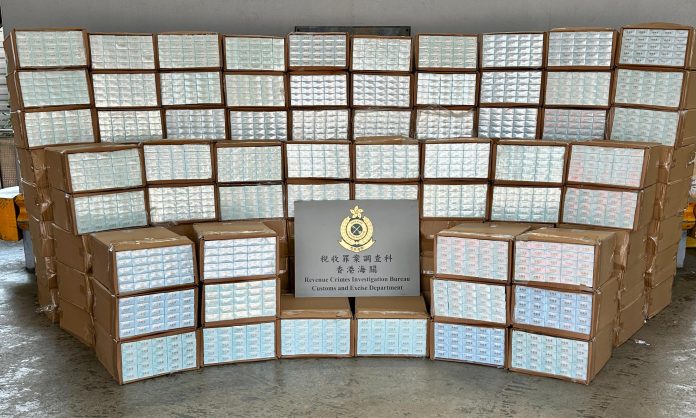
Hong Kong Customs foiled seaborne cigarette smuggling attempts in two separate cases, in which containers arriving from Cambodia and South Korea were found to have 15m contraband cigarettes with a value of HK$54 million (US$6.9 million), with HK$36 million (US$4.6 million) of evaded duties.
In the first case, through risk assessment and intelligence analysis, customs officers on 21 September selected and inspected a 20-foot seaborne container, declared as carrying palm oil, arriving in Hong Kong from Cambodia. About 4 million suspected duty-unpaid cigarettes were found inside the container and seized.
On 25 September, another case was detected in which customs officers inspected a 40-foot seaborne container, arriving in Hong Kong from South Korea and declared it as containing automobile parts. About 11 million suspected illicit cigarettes were seized therein.
In between the confiscation of the contraband cigarettes in the containers, on 23 September, about 3.1 tonnes of contraband manufactured tobacco were seized by customs officers who stopped a lorry at the Lok Ma Chau Control Point.
The lorry was declared as carrying staplers early this morning. Upon inspection, customs officers found the batch of suspected duty-not-paid manufactured tobacco inside 116 carton boxes mix-loaded with other goods on board the lorry. The male lorry driver was subsequently arrested and the lorry was detained.
The manufactured tobacco has an estimated market value of about US$2.04 million and a duty potential of about US$1.2 million. Customs believes that the manufactured tobacco would be transshipped overseas. An investigation is ongoing and more arrests could be made.
More contraband cigarettes are being smuggled into the Hong Kong, after the government upped tobacco taxes by HK$12 (US$1.50) in February, pushing cigarette prices up to HK$78 (US$10) a pack.
More than 470 million contraband cigarettes worth more than HK$1.5 billion (US$191.4 million) so far this year, which would have generated over HK$1 billion (US$127.6 million) in tax revenue.
Martina Li
Asia Correspondent








